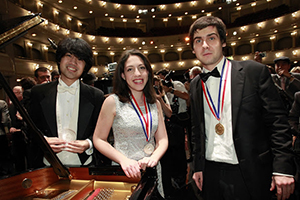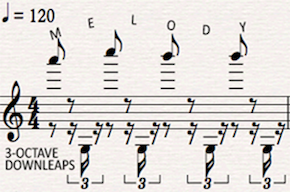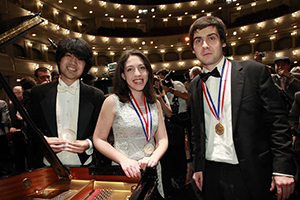
Photo by Ralph Lauer/The Cliburn
If piano competitions were simply out to identify and reward superheroes, they would require contestants to be faster than a speeding prestissimo, more powerful than a loco Lang Lang, and able to leap five octaves in a single bound. But the mission of the Van Cliburn International Piano Competition is to “embody an enduring commitment to artistic excellence and the discovery of young artists” (italics added). Thus, although all contestants at this year’s 14th competition in Ft. Worth displayed the brawn of technique, the brain of artistry proved to be the deciding factor in choosing three medalists Sunday night.
Vadym Kholodenko from Kiev won the gold and $50,000 with fine performances of Prokofiev’s Piano Concerto No. 3 and Mozart’s 21st concerto in C. Beatrice Rana from Copertino in the heel of Italy won the $20,000 silver for a nice rendition of Beethoven’s Third concerto and a game but flawed attempt to leap over a very tall building: the Prokofiev Concerto No. 2. Coming in third for the Crystal Award of $20,000 was Florida-born and Ventura-County-raised Sean Chen, who won the most enthusiastic applause for his flashy Rachmaninov Third concerto and a vigorous Beethoven “Emperor” Concerto No. 5 in E-flat.
The spotlight of acclaim on the winners at this point, like it or not, puts much of the preceding hard work on the part of 30 competitors back into the shade. You might wonder: How many of the technique-rich entrants displayed superior artistry or revealed the potential to do so in the preliminaries? The repertoire they chose, and the new piece they were all required to play, are revealing in this regard.
One aspect of artistry can be adventurousness of repertoire. Unfortunately, if you look at the range of composers represented in the over 300 pieces played in solo recitals prior to the concertos (pieces played more than once included as multiple counts), you discover that unusual repertoire is pretty much the exception. Two thirds of the compositions were written by only 9 composers, the other third by only 34 others. The top 4 composers were Chopin (74 pieces), Liszt (38), Rachmaninov (18), and Beethoven (16). Aside from Christopher Theofanidis, whose commissioned work, Birichino was played 12 times by semi-finalists, only four other living composers were represented, with one piece each: John Adams, Lowell Liebermann, Nikolai Kaputsin, and Carl Vine. Only 5 or 6 deceased composers could be considered relatively unusual.
So the avenue of artistry in choosing unusual repertoire was pretty much a back alley (except that six of the late Geogy Ligeti’s magnificent etudes, however, received performances, from more than one contestant).

Of course, high-quality standard works, like so many of Chopin’s, allow many opportunities to reveal artistry, and those competitors who rose to the top provided many examples of subtle phrasings, knowledge of the Big Picture, and other tasteful approaches to the music at hand. I must say, however, that many of the Liszt pieces, and Liszt’s and other composers’ arrangements of other composer’s music, contributed little in the artistry department. These diversions all too often resulted emphasizing noise and flash over substance.
Theofanidis’ Birichino was of particular interest in both the artistic and technical area. It turned out to be one of those tall buildings that no one could quite leap over. The title means “little prankster.” And big prankster Theofanidis put in a beautiful melody at one point that has to be played with the right hand doing three-octave jumps in between each note of the melody, all at a very fast pace. (Even if you can’t read music, you can appreciate how far apart the notes are in the illustration.) Most contestants played the notes like popguns, and even the few who brought a smoother tone to the notes ended up with inaccuracies because the wide leap occasionally caused their fingers to hit adjacent keys. (Kholodenko received the $5,000 Beverly Taylor Smith award for the best performance of the new piece, but I felt another contestant, Australian Jayson Gillham, did an even finer job.)
I have fond memories of where contestants’ artistry particularly struck me. One was the choice of Stephen Lin to play Vine's wonderful sonata. Vine is an Australian composer is little known in these parts, and deserves more recognition. (Unfortunately, Lin did not make the Finalist cut.) Another was Finalist Fei Fei Dong’s revelatory emphasis of countermelodies in the first movement of the Rachmaninov Concerto No. 3. Most amazing of all to me was Kholodenko’s fascinatingly contrapuntal cadenza for the Mozart concerto he played. He wrote it himself, while on the plane flying to Ft. Worth. Now that shows the guts of a true superartist. May he avoid kryptonite down the road, and prosper!

